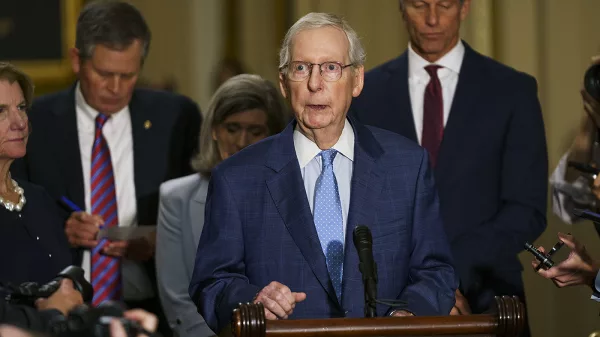On September 29th, the senior senator from California, Dianne Feinstein, passed away from natural causes at the age of 90. As the oldest member of Congress, and having faced numerous health-related issues, news of her death saddened many but did not come as a surprise. When she announced this February that she would not be running for reelection next year, many doubted that she would even be alive by the time reelection came around.
Senator Feinstein was often absent from the Senate due to medical challenges. Earlier this year, she was hospitalized over a 10-week period for shingles that left the left side of her face paralyzed. Additional problems with her eyesight and balance prompted her to use a wheelchair for the rest of her time in the Senate. While she continued to appear at most senate meetings and votes, at times she appeared confused and required a great deal of assistance from her aides. In a much-publicized incident last July, Senator Feinstein was told to “just say aye” by an aide and fellow senator after rambling off-topic during a vote on a defense appropriations bill.

The average age of the United States Senate has consistently gotten older over time, peaking at one of its highest levels today. It is the third-oldest national legislature among major democracies, overtaken only by Canada’s Senate and Britain’s House of Lords. With an average age of 64, slightly less than double the country’s average age of roughly 39, many are questioning both the capacity of senators as they enter advanced ages and just how representative a Senate this old can truly be. In addition to her other medical problems, Senator Feinstein’s short-term memory issues were a well-known secret all across the capitol, but naturally, she was not the only senator concerning the public. Among others, Senate Minority Leader Mitch McConnel, who is 81, was the cause of great concern this summer after freezing twice in the middle of two separate press conferences within less than two months.

The old age of the Senate, which only has two senators under the age of 40, has angered many, but in particular, the American youth, many of whom feel underrepresented in politics, ruled by a government that does not understand them or the issues they face. To name just a few, problems such as climate change, wealth inequality, gun control, and further strides toward racial equality are considered by many young Americans as important issues to solve that have not been acted on by the Senate. In particular, climate change and gun control are issues that particularly incense the youth of America. As demonstrated by Fridays for the Future marches and school walkouts protesting gun violence and school shootings, these issues motivate the American youth but don’t appear to have similar effects on lawmakers.
While by law one must be 30 years old to serve in the Senate and 25 to serve in the House of Representatives, many are upset by the dominance of older generations such as the Silent Generation or the Boomers, who represent an outsized share of Congress compared to their share of the US population. The share of women, LGBTQIA+, and foreign-born Congress members has grown over the years. However, the share of members from younger generations such as Millennials or Gen Z’ers has not shown similar progress, rising only 1% from the last Congress. America’s Youth are politically active on a scale never seen before, serving in local offices, working in the offices of and campaigning for politicians, and organizing petitions and protests. Yet, they have little faith in their government and find it difficult to believe that it cares about them. This feeling of political underrepresentation has had tangible effects on American politics regardless of party affiliation: youth turnout in elections is less than 50%, and 15% less than the average national turnout. In a country championing its progressiveness, this turnout rate is alarming, as it is one of the lowest rates in the world among its democracies.
Despite all this, there are some who argue that having a senate comparably older than the country is a good thing. Studies have found that an older congress focuses more on policies benefiting the elderly, such as the ADA and similar legislation, a clear benefit as the elderly are an at-risk group and face many issues not faced by younger generations. Furthermore, many Americans respect the age of their politicians and believe it comes with increased wisdom, a belief further heightened for politicians who have served in the Senate for many years. Many find young legislators hard to trust and feel they do not have the experience necessary to understand the complexities of government that more elderly politicians have had time to acquire.
Still, incidents such as those of Senators Feinstein, McConnell, and many more have prompted calls from some for there to be changes to the Constitution regarding age limits or cognitive ability tests for government officials after they pass a certain age. However, critics are wary of being called ageist in an era where medical advancements have allowed life expectancy to grow worldwide, and where many countries are raising retirement ages. Canada, for example, forces senators to retire once they turn 75, and a similar rule has been suggested for the US. However, such a law would be challenging to pass in today’s congress.
As the next generation of global leaders, IE students should pay close attention to how the US handles this issue; as the population of many Western nations ages further, such problems may spread beyond US borders. The world’s population is set to peak in the coming decades, meaning this problem may soon be more common. While the majority of European politics are considered more stable than those in the States, European nations such as Germany and Italy who have rapidly aging populations may face similar issues. Nevertheless, the death of Dianne Feinstein served to many as just another sign of the gerontocratic problems within the US Congress and has motivated a new spree of calls to control the issue of old age within the Senate and House.







